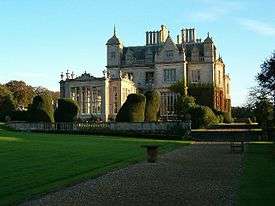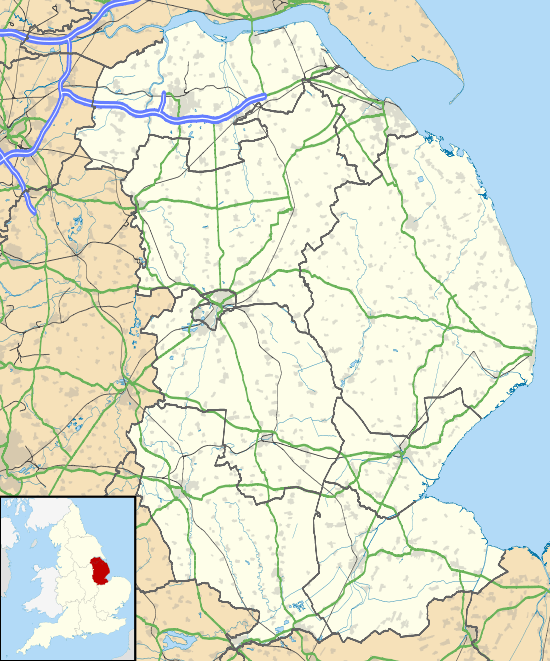Stoke Rochford Hall
Stoke Rochford Hall is a large house built in scenic grounds, with a nearby golf course, next to the A1 in south Lincolnshire, England.
| Stoke Rochford Hall | |
|---|---|
 | |
 | |
| Former names | Kesteven College of Education |
| General information | |
| Type | House |
| Architectural style | Jacobean & Elizabethan |
| Location | Stoke Rochford, South Kesteven, Lincolnshire |
| Coordinates | 52.84197°N 0.63789°W |
| Construction started | 1843 |
| Dimensions | |
| Other dimensions | 28 acres (11 ha) |
| Design and construction | |
| Architect | William Burn |
The parkland and gardens of Stoke Rochford Hall are listed Grade II* on the Register of Historic Parks and Gardens.[1]
History
The remains of a Roman villa and bath house were identified by William Stukeley in 1739[2] and again in 1824 and 1960.[3] No substantive ruins are preserved.
The Neville family had a house on the site in the 14th century. The estate passed to the Rochfords in the 15th century, whence comes the name of the estate, and to the Coneys in the 16th century. It was purchased by Sir Edmund Turnor around the time he was knighted in 1663. He began building a grand house in 1665, which was demolished in 1774. In 1794 the Turnors built a smaller house at Stoke, this was the house replaced by the current structure in the 1840s.[4] The estate was occupied by Harry Wyndham Jefferson and his wife Gwendolen Mary Talbot at the beginning of the 20th century.[5]
The present building dating from 1843 was designed by architect William Burn,[6] for Christopher Turnor. For the rest of the 19th century and early 20th century it was owned by the Turnor family. Christopher Turnor's grandson sold 6,000 acres (2,400 ha) of the Wragby estate in 1917. He started holding summer conferences at the hall. In August 1940, the estate was taken over by his first cousin, Major Herbert Broke Turnor.
In 1940 the house was requisitioned by the War Office, and used for a variety of purposes. It became the headquarters of the Second Battalion, the Parachute Regiment. It was in the library at Stoke Rochford that the ill-fated 1944 Arnhem 'drop' was planned.[4]
Purchased in 1948 from the War Office by Kesteven County Council who built modern student accommodation, the hall was home to Kesteven College of Education, a teacher-training college which closed in 1978. It retained a connection with education, as the training and conference centre of the National Union of Teachers. It was not solely used by the NUT, but is used by national organisations and companies for conferences or seminars, being closely situated to the A1 and Grantham railway station. It has banqueting facilities, a sports club and a restaurant, and is used for wedding receptions and parties. In 2016 it was sold to Talesh Hotels Group.[7]
On 25 January 2005 a fire gutted the interior of the hall. It was restored by English Heritage which cost £12m over three years.
On 17 April 2018, Stoke Rochford Hall joined Best Western Hotels and Resorts in Great Britain as part of its BW Premier Collection.[8]
Architectural style
The hall is built in a Jacobean style, with many chimneys. It was designed by William Burn, who also laid out the gardens in collaboration with William Andrews Nesfield.[6] The gate lodge, also in a Jacobean style, was designed in 1834 by Cornelius Sherborne.[4]
The front elevation of the Elizabethan stables was re-erected and the stone frontispieces still stand in the park. This carries the dates 1676 and 1704, representing their original erection and re-building.[4]
Golf
A golf course was laid out in 1924 by Christopher Turnor.[9] It is still in use and is home to Stoke Rochford golf club.[10]
See also
References
- Historic England, "Stoke Rochford Hall (1000991)", National Heritage List for England, retrieved 11 January 2017
- "National Monument Record for Stukely's Roman discoveies".
- "National Monument Record for 1824 Roman discoveries".
- "Historical details from the Hall's own web site". Archived from the original on 1 September 2010.
- "Harry Wyndham Jefferson - M, #357856", thePeerage.com. Retrieved 15 November 2011
- "National Monument record for the house and park". Archived from the original on 23 December 2012.
- http://www.granthamjournal.co.uk/news/new-owners-of-historic-stoke-rochford-hall-hotel-vow-to-invest-1-7751160
- Talash Hotel Group Owned Property Joins Best Western
- "National Monument Record for golf course". Archived from the original on 14 July 2012.
- Stoke Rochford golf club
External links
- Official website
- Former Kesteven College
- Britannia Tours
- January 2009 Lincolnshire Life article about the Hall's restoration
Video links
- On bridge overlooking lake video. Retrieved 18 December 2010